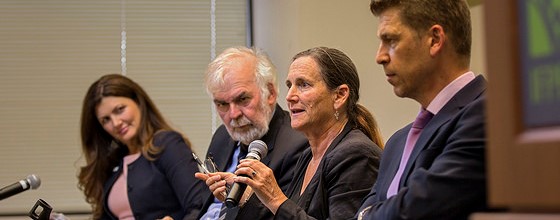“Turning political commitment into implementation and into impact – that is the kind of watershed moment that we are at with regard to malnutrition in most of these countries,” said Stuart Gillespie, co-editor of Nourishing Millions: Stories of Change in Nutrition, during the US launch of the book in Washington, DC on June 29, 2016. Gillespie, who is also a Senior Research Fellow at IFPRI and CEO of the Transform Nutrition Research Program Consortium, noted that while the multisectoral nature of malnutrition is now recognized and better understood, operationally taking that to scale and sustaining it is the remaining challenge. The event was hosted by the International Food Policy Research Institute (IFPRI) and featured highlights from the book followed by a discussion of how to scale up as well as accelerate progress on nutrition.
Special Adviser to the UN Secretary-General on the 2030 Agenda for Sustainable Development and Climate Change, David Nabarro, noted in his video message that stories such as those documented in Nourishing Millions will be critical to delivering on the goal of ending malnutrition as part of the 2030 agenda for sustainable development. “As attention to nutrition increases, it has become clear that the international community does need guidance on how to design, implement, and evaluate policies and interventions that promote better nutrition,” he said. Likewise, given the multisectoral challenge of malnutrition, delivering on the sustainable development goals of eliminating rural poverty, empowering women, and transforming agricultural and food systems will be essential for ending malnutrition.
“What we scale is important, but how we scale and the operational learning we derive from it is even more critical,” said Ellen Piwoz, Initiative Lead of the Nutrition Team in the Global Development Program of the Bill and Melinda Gates Foundation. She pointed to examples from chapters in Nourishing Millions as well as from programs funded by the Gates Foundation that have demonstrated the importance of partnerships and alliances, systems-level thinking, context-specific implementation strategies, and strategic use of data for the acceleration of action against malnutrition.
Drawing on his experience with the Scaling Up Nutrition (SUN) Movement, Tom Arnold, Coordinator ad interim of SUN, shared how 57 countries have committed to scaling up efforts to reduce malnutrition. He noted that while progress has been made, much more is needed in terms of investment in nutrition, support for women and girls, and collaboration between the academic community and policymakers. Supporting learning among SUN countries and from stories such as those documented in Nourishing Millions will be essential. “There is going to be a huge focus over the next five year on results… and intensifying the learning is at the heart of how SUN can achieve change,” said Arnold.
Lucy Sullivan, Executive Director of 1,000 Days, highlighted achievements that have already been made to accelerate efforts to end malnutrition, including the UN declaration of a Decade of Action on Nutrition, and she called for the nutrition community to continue building momentum through future opportunities such as the 2017 G20 meeting hosted by Italy and the 2020 Olympics hosted by Tokyo. More work is needed on key issues such as how to address the double burden of undernutrition and obesity through more effective food systems, and how to ensure the full and equal participation of women and girls when one billion of them are malnourished. Ultimately, said Sullivan, “We need more of the people that see and are living with malnutrition in their communities to raise their voices, to be heard, and to drive that level of accountability. This is about making the invisible visible.”
An active exchange between audience members and the panelists followed, touching on issues including the role of the private sector, translating political commitments to action, and how to simplify multisectoral approaches to combatting malnutrition.
The Director General of IFPRI, Shenggen Fan, closed the launch, remarking on the tremendous movement over the last 10 years to accelerate progress toward ending malnutrition including the Zero Hunger Initiative, SUN, Second International Conference on Nutrition (ICN2), and 2030 Agenda for Sustainable Development. He called for more research, innovation, and knowledge to empower communities to demand action against malnutrition, noting the role that Compact2025 can play to support these efforts. Said Fan, “If we can empower communities and citizens with nutrition knowledge, …if they can push their political system from the bottom up, that may be a game changer.”
For more information on this event, including a full video recording, visit http://www.ifpri.org/event/nourishing-millions-stories-change-nutrition.



